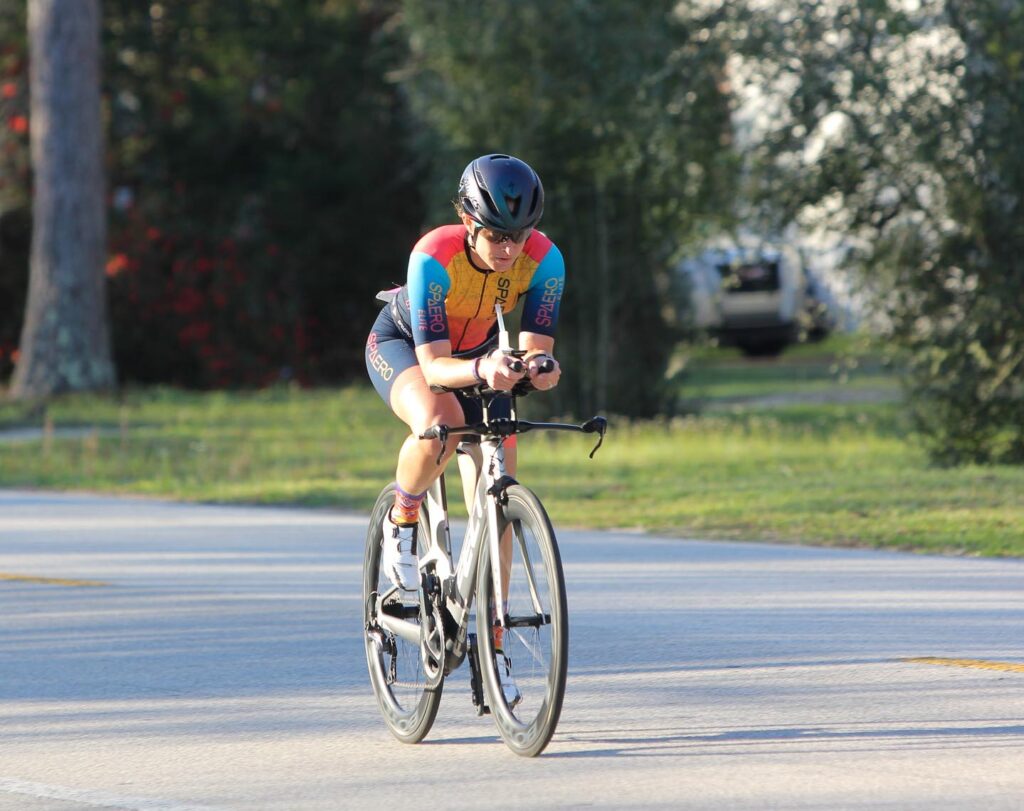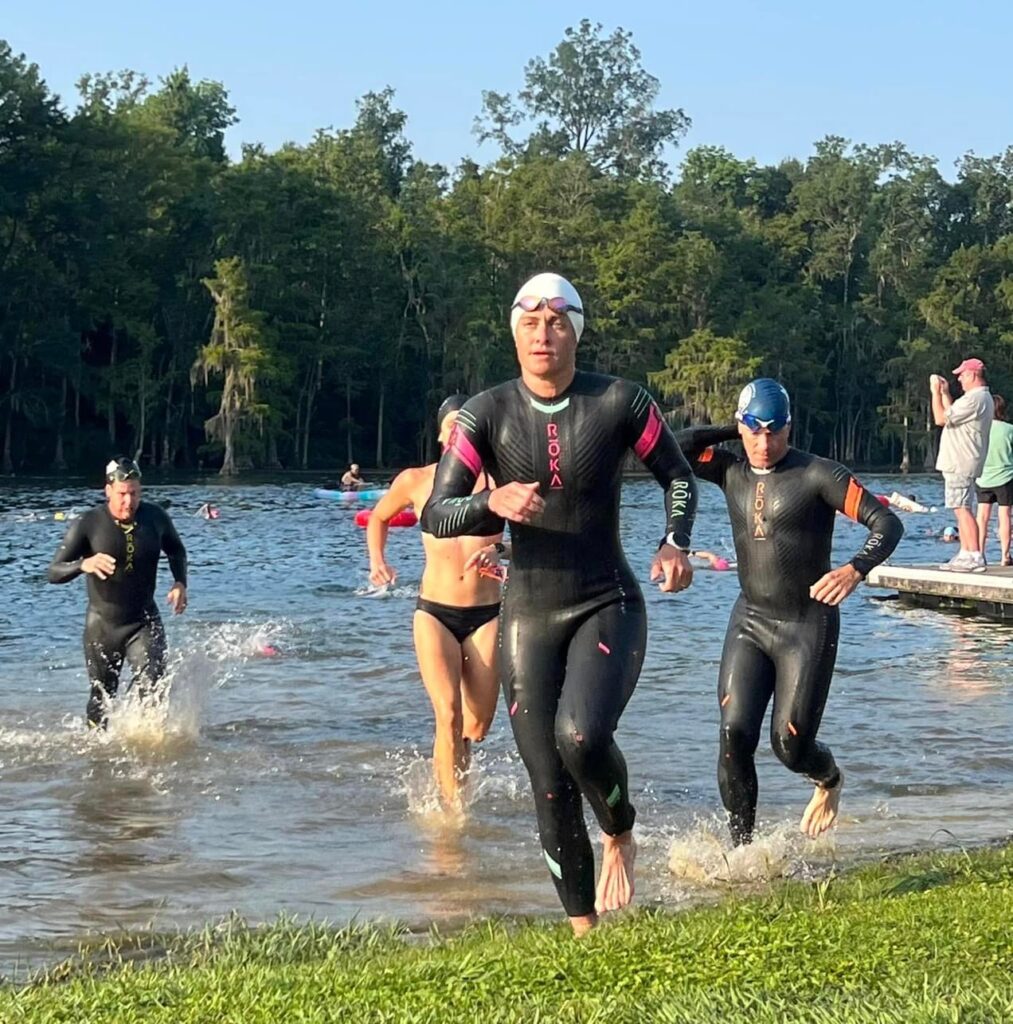
Resilience is a buzz word that’s all the rage in business, sports, and personal development, but what does it really mean? The way I think about resilience is having mental strength and developing the ability to adapt, adjust, and keep moving forward.
It’s about having the mental toughness to be able to push through and persevere, no matter what obstacles you encounter.
At our local triathlon club meeting, our president talked about how most of our problems as athletes can be found in the space between our ears.
It’s so true!
More often than not, our ability to do hard things isn’t restricted by our physical capability, skill, or talent (although those things do help). The reason we can’t do hard things is because we believe we can’t.
We get in our own way by not actively working on our self-confidence. Instead of exposing ourselves to frightening situations, we stay away because it feels safer. We compare ourselves to others because they seem more talented, faster, stronger, smarter, ect.

Mental toughness can be trained
People like to say that that doing an Ironman is 90% mental and 10% physical. Having done an Ironman, I’m going to say those percentages are a bit skewed… It’s more like 60/40, but the emphasis on the importance of mental strength and resilience is a good one.
Resilience is an umbrella term that encompasses a lot of other things: goal setting, building confidence, dealing with nerves, creating a positive mindset, and overcoming setbacks.
People tend to think that you either have these skills, or you don’t. Like the ability to be mentally strong is something you’re just born with. It’s true that some people are more naturally self-confident and motivated, but these are definitely skills you can train.
When was the last time you were great at something the first time you tried?
I remember when I learned how to swim for the first time. I could swim to the end of the pool and back. 50 yards and that was it.
But over time, I learned technique and form from my coach, set goals, and practiced. Now, a few years later, the swim is one of my strongest disciplines. Last year, I did a 3-mile swim at the Hammerhead Ocean Marathon in Jacksonville.
Building resilience and mental strength is like learning a new skill. It takes time, and you have to put in the work.
Science has shown that mental toughness can be trained. Your brain is one of the most important muscles you have. (Although it’s technically an organ and not a muscle.) Nevertheless, the more you exercise your brain, the stronger it becomes.
Scientific Evidence that Mental Fatigue Limits Physical Performance- A Cool Study
In this study, Samuele Marcora of Bangor University proposed that mental fatigue can limit our physical ability to perform. Toward the end of a long race, when your legs are burning and you can’t breathe, do you slow down because you really can’t continue, or because your mind tells you that it’s too hard?
During the study, 16 cyclists rode to exhaustion at 80% of peak power after 90 minutes of a demanding cognitive task (mental fatigue) or 90 minutes of watching a documentary (control). The mentally fatigued subjects reported a significantly higher perception of effort during exercise. But it wasn’t just their rate of perceived exertion; their time to exhaustion (physical performance) was significantly lower than the control group.
Exposure to challenging situations builds resilience
One of the ways we can work on building mental toughness is by exposing ourselves to challenging situations. Frightened of open water swimming? Repeated positive exposure in a safe environment can help you conquer that fear.
Struggle climbing hills on the bike? Don’t stick to flats; seek out the hills, work on your technique, and build strength.
Have a hard time running in the heat? Repeated, low intensity periods of running during a hotter time of the day will improve your endurance.
In addition to working on mental strength during training, you may encounter challenging scenarios on race day. Every time you successfully navigate one of those experiences, you build confidence knowing that you can face hard things and come out on the other side.
My most challenging triathlon moments
- 2021 70.3 World Championship in St. George, Utah– A massive storm hit just as we came out of the swim and started the bike. 30 mph wind, hail, lightning, and bikes getting blown across the road. I had to make a decision to either stand on the side of the road and wait for the storm to pass or ride through it. After riding about 15 miles, the storm dissipated and the sun came out again.
- 2023 70.3 Chattanooga and 70.3 Augusta– I was on track for a big PR when extreme nausea hit during mile 8 of the run. Something like that had never happened before and was a total surprise. Having that happen at back to back races just months before my first full Ironman was nerve-racking to say the least.
- 2023 Ironman Florida– I got stung on my right quad by a yellowjacket as I rode out of transition to start the bike. Riding the first 50 miles with a leg that felt like it was on fire wasn’t ideal. But the pain dissipated during the last half of the bike and, by the marathon, I didn’t feel a thing.

Tips to build resilience and mental strength
- Staying motivated while training– Setting goals can go a long way towards helping you stay motivated. Long term goals provide vision and purpose, like signing up for a race. This is the easiest type for most people, but don’t neglect short term goals. Setting short term goals and achieving them in training helps build confidence, which enhances your ability to overcome challenges on race day. When you reach a certain milestone, like your first 2,000-yard swim or first century ride, it provides you with validation and encouragement.
- Dealing with injury– Most athletes will face an injury at some point in their life. I’m not here to tell you that it’s fun, because it’s not. It sucks. But instead of focusing on what you can’t do; focus on what you can do. Can’t run? Do a bike-focused block or perfect your swim technique. Consistently do rehab exercises that will help you get back to full strength and prevent future injury.
- Race day anxiety– There are plenty of mental strategies you can use to overcome nerves on race day, like breathing techniques, visualization, and positive self-talk. Some athletes scoff at this idea, thinking it’s silly or doesn’t work, but there’s a reason why elite athletes and top teams have a mental performance coach and sport psychologist on staff. Not only because it works, but because it’s a necessary part of being a prepared athlete.
- Rebounding from disappointment– After a bad race or tough workout, it’s easy to get down on yourself. There’s nothing wrong with feeling disappointment; that shows you care about something and feel hurt because it didn’t go the way you planned. But there’s something positive to be found in every bad experience. Take some time to process the negative emotions and do some self-reflection. Then, make a plan to fix what went wrong and crush it the next time out.


